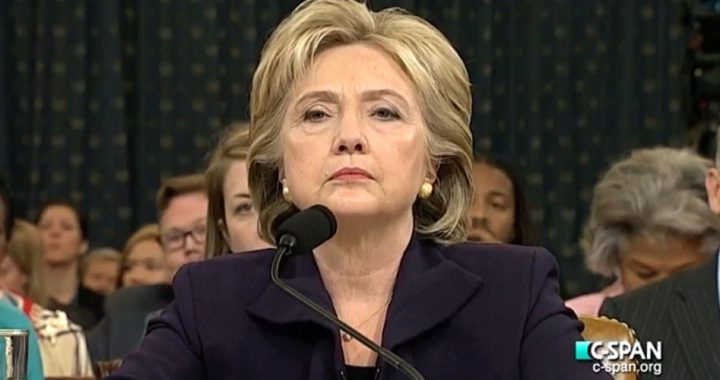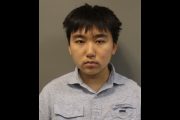
Hillary Clinton (shown) spent 11 hours testifying before the House Select Committee on Benghazi on October 22, 2015. It looks like she spent much of that time misleading the committee — if not outright lying. Now that 66 percent of her State Department e-mails—– totaling thousands of communications — have been released, it is obvious that much of her testimony was imbued with the type of fact twisting and truth bending that is characteristic of the Clintons.
Judging from the veneer-thin lies Hillary has told about her private e-mail server and account (“I never sent or received any e-mail that was deemed classified, that was marked classified“), it appears she has something to hide. Considering the very Clintonian way she chose to answer direct questions from the Benghazi committee with dishonesty and subterfuge, the something she has to hide may be related to Benghazi.
When asked by Representative Mike Pompeo (R-Kan.) about her previous testimony that she had never received any requests, including those for diplomatic security, sent by Ambassador Chris Stevens — who died during the Benghazi attack on September 11, 2012 — Hillary again denied that any requests from the American diplomatic compound had ever “reached her desk. Pompeo said, “That’s over 600 requests,” adding, “You’ve testified here this morning that you had none of those reach your desk; is that correct also?” Hillary replied, “That’s correct.”
The problem, though, is that it was not correct. As the recently released e-mails show, though there isn’t evidence yet that she received e-mails from Stevens regarding security measures, she did receive e-mail correspondence from Chris Stevens requesting humanitarian aid to be sent to the compound. As Fox News reported:
The Aug. 22, 2011 email from Stevens was circulated among Clinton staff and delegated for action in under an hour.
With the overthrow of Qadaffi, Stevens wrote that the Libyan opposition, known as the TNC, would soon release a statement saying it would “insure the delivery of essential services and commodities (esp. addressing the acute shortages of fuel, children’s milk, and medication for blood pressure and diabetes).”
Seventeen minutes later, Clinton responded, “Can we arrange shipments of what’s requested?”
Hillary also denied — under oath — that long-time Clinton confidant Sidney Blumenthal had advised her on anything to do with Libya, saying, “He was not at all my adviser on Libya.” Again, though, those e-mails that Hillary tried to keep from seeing the light of day tell another story. In one e-mail, dated November 12, 2012, Blumenthal advised Secretary Clinton that “in response to press question[s] that you make yourself available” she should use the opportunity to “publicly and directly puncture conspiracy fever on Benghazi before any closed hearing.” His advice was not confined to damage control after the fact. A year and a half before the attack, Blumenthal e-mailed Hillary to advise her on the adoption of a no-fly zone over Libya.
As Fox News also reported:
But a newly released email from February 2011 shows Blumenthal advocated for a no-fly zone over Libya, writing, “U.S. might consider advancing tomorrow. Libyan helicopters and planes are raining terror on cities.” The email was forwarded by Clinton to her deputy chief of staff Jake Sullivan with the question, “What do you think of this idea?”
Jake Sullivan not only forwarded the e-mail in which Blumenthal acted as Hillary’s “adviser on Libya,” contrary to Hillary’s sworn testimony, he also advised his boss on keeping her story straight as she misled the American people about the attack, the motive behind it, and her knowledge of it. After Hillary described the attack as stemming from protests over a YouTube video, Sullivan told her in an e-mail, “You never said spontaneous or characterized the motives. In fact you were careful in your first statement to say we were assessing motive and method. The way you treated the video in the Libya context was to say that some sought to *justify* the attack on that basis.” He then went on to provide her with a list of all her public statements “up to that date so she could remember exactly what she had said so far,” according to a report by the Washington Examiner.
Hillary, who has steadfastly denied that she ever sent or received any classified information using her private e-mail server, continued those denials in her testimony. She claimed that during the attack, she relied on the live updates she received in person and on secure lines of communication. Heavily redacted e-mails released — while not providing any details — show that she did, indeed, receive e-mail updates on the attack.
While there may not be enough bandwidth on the Internet to publish a complete list of Hillary’s lies, The New American has reported on many of the twists and turns of her lies regarding her use of the private e-mail server. This time, though, she has stepped her game up to a whole new level. Maybe she should have had Jake Sullivan help her keep track of all her various statements about the e-mail server. She seems to be losing track.




